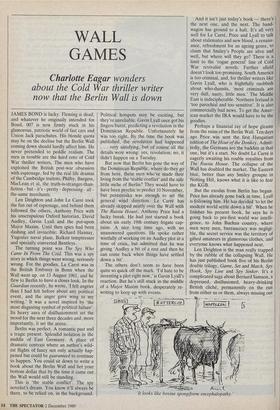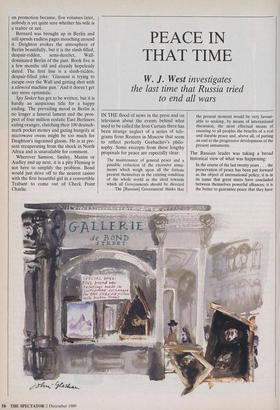WALL GAMES
Charlotte Eagar wonders
about the Cold War thriller writer now that the Berlin Wall is down
JAMES BOND is lucky. Fleming is dead, and whatever he originally intended for Bond, 007 is now firmly stuck in his glamorous, patriotic world of fast cars and Union Jack parachutes. His blonde quota may be on the decline but the Berlin Wall coming down should hardly affect him. He never pretended to peddle realism. The men in trouble are the hard core of Cold War thriller writers. The men who have exploited the British post-war obsession with espionage, fed by the real life dramas of the Cambridge traitors, Philby, Burgess, MacLean et al, the truth-is-stranger-than- fiction - but - it's - pretty - depressing - all - the-same merchants.
Len Deighton and John Le Carre took the fun out of espionage, and behind them followed the others, Anthony Price with his unscrupulous Oxford historian, David Audley, Gavin Lyall and the put-upon Major Maxim. Until then spies had been dashing and invincible: Richard Hannay, Yugoslav naval plans, Balkan temptresses and specially converted Bentleys.
The turning point was The Spy Who Came In From The Cold. This was a spy story in which things went wrong, seriously wrong. For the goodies. Le Carre was in the British Embassy in Bonn when the Wall went up, on 13 August 1961, and he flew to Berlin to have a closer look. In the Guardian recently, he wrote, 'I felt angrier than I had felt before about any political event, and the anger gave wing to my writing.' It was a novel inspired by 'the most disgusting symbol of political failure'. Its heavy aura of disillusionment set the mood for the next three decades and, more importantly, it set the arena.
Berlin was perfect. A romantic past and a tragic present. Splendid isolation in the middle of East Germany. A place of dramatic contrast where an author's wild- est flights of fancy not only actually hap- pened but could be guaranteed to continue to happen. You could sit down to write a book about the Berlin Wall and bet your bottom dollar that by the time it came out the Wall would still be standing.
This is 'the stable conflict'. The spy novelist's dream. You know it'll always be there, to be relied on, in the background. Political hotspots may be exciting, but they're unreliable. Gavin Lyall once got his fingers burnt, predicting a revolution in the Dominican Republic. Unfortunately he was too right. By the time the book was published, the revolution had happened . . . very satisfying, but of course all the details were wrong: yes, revolution; no, it didn't happen on a Tuesday.
But now that Berlin has gone the way of the Dominican Republic, where do they go from here, these men who've made their living from the 'stable conflict' and the safe little niche of Berlin? They would have to have been psychic to predict 10 November, but perestroika was enough to set the general wind direction. Le Carre has already skipped neatly over the Wall with The Russia House. Anthony Price had a lucky break. He had just started a book about six early 19th century frigate cap- tains. A nice long time ago, with no unanswered questions. He spoke rather wistfully of working on an Audley plot at a time of crisis, but admitted that he was giving `Audley a bit of a rest and then he can come back when things have settled down a bit'.
The others don't seem to have been quite so quick off the mark. 'I'd hate to be inventing a plot right now,' is Gavin Lyall's reaction. But he's still stuck in the middle of a Major Maxim book, desperately re- writing to keep up with events. And it isn't just today's book — there's the next one, and the next. The band- wagon has ground to a halt. It's all very well for Le Cant, Price and Lyall to talk about stalemates and new blood, a renaiss- ance, refreshment for an ageing genre, to claim that Smiley's People are alive and well, but where will they go? There is a limit to the 'rogue general' line of Cold War revivalist novels. Further afield doesn't look too promising. South America is too criminal, and, for thriller writers like Gavin Lyall, who is frightfully snobbish about who-dunnits, 'most criminals are very dull, nasty, little men.' The Middle East is indecipherable. Northern Ireland is `too parochial and too sensitive'. It is also commercially bad news. To get the Amer- ican market the IRA would have to be the goodies.
Perhaps a financial ray of hope gleams from the ruins of the Berlin Wall. Ten days ago Price was sent the first Hungarian edition of The Hour of the Donkey. Admit- tedly, the Germans are the baddies in that one, but it's a start. No doubt Le Carre is eagerly awaiting his rouble royalties from The Russia House. The collapse of the Wall has doubled the market. The Eastern bloc, better than any Smiley groupie in Notting Hill, knows what it is like to fear the KGB.
But the exodus from Berlin has begun. Price has already gone back in time, Lyall is following him. He has decided 'to let the modern world settle down a bit'. When he finishes his present book, he says he is going back to pre-first world war intelli- gence, to John Buchan country, where men were men, bureaucracy was negligi- ble, the secret service was the territory of gifted amateurs in glamorous clothes, and everyone knows what happened next.
Len Deighton is the man really trapped by the rubble of the collapsing Wall. He has just published book five of his Berlin double trilogy, Game, Set and Match, Spy Hook, Spy Line and Spy Sinker. It's a complicated saga about Bernard Samson, a depressed, disillusioned, heavy-drinking British cliche, permanently on the run from either us or them, always missing out `It looks looks like bovine spongiform encephalopathy.' on promotion because, five volumes later, nobody is yet quite sure whether his wife is a traitor or not.
Bernard was brought up in Berlin and still spends endless pages mooching around it. Deighton evokes the atmosphere of Berlin beautifully, but it is the slush-filled, despair-ridden, semi-derelict, Wall- dominated Berlin of the past. Book five is a few months old and already hopelessly dated. The first line is a slush-ridden, despair-filled joke: 'Glasnost is trying to escape over the Wall and getting shot with a silenced machine gun.' And it doesn't get any more optimistic.
Spy Sinker has got to be written, but it is hardly an auspicious title for a happy ending. The prevailing mood in Berlin is no longer a funeral lament and the pros- pect of four million ecstatic East Berliners eating oranges, clutching their 100 deutsch- mark pocket money and gazing hungrily at microwave ovens might be too much for Deighton's ingrained gloom. He is at pre- sent recuperating from the shock in North Africa and is unavailable for comment.
Wherever Samson, Smiley, Maxim or Audley end up next, it is a pity Fleming is not here to simplify the problem. Bond would just drive off to the nearest casino with the first beautiful girl in a convertible Trabant to come out of Check Point Charlie.











































































 Previous page
Previous page